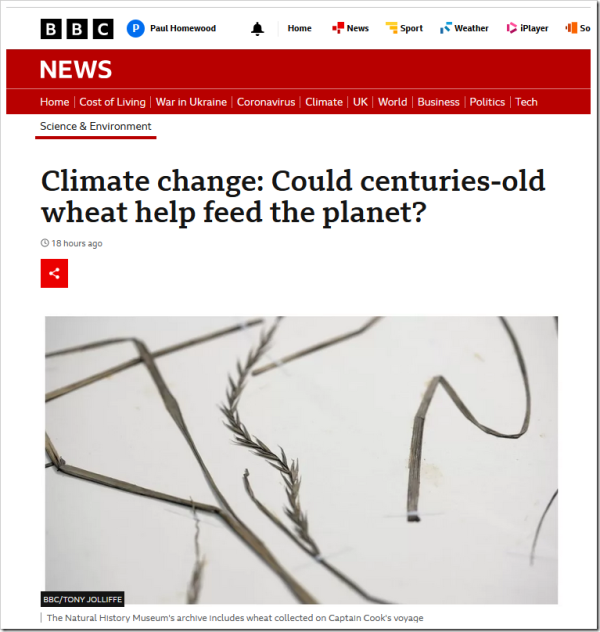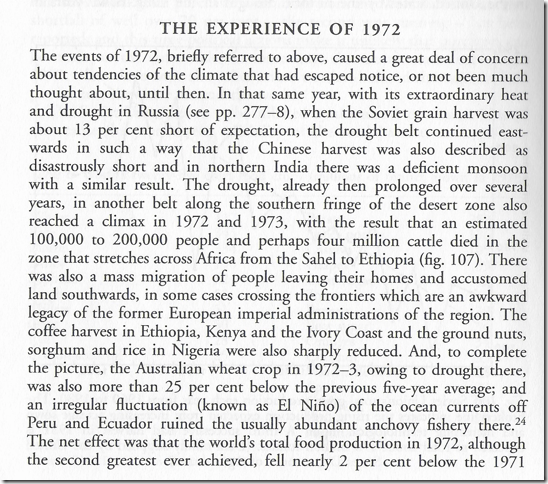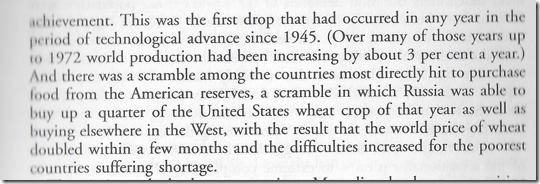By Paul Homewood
The babies at the BBC are at it again:
Could the key to feeding the world with a changing climate be hiding in a 300-year-old museum collection?
That’s one of the hopes of scientists combing through 12,000 specimens of wheat and its relatives held in the Natural History Museum’s archives.
The most promising samples are having their genomes sequenced in a bid to identify the genetic secrets of hardier wheat varieties.
Climate change and pests and diseases are putting the crop under pressure.
The old varieties of wheat are stored in hundreds of old cardboard files, neatly lined up, row upon row, in the museum vaults. Each one contains dried leaves, stems or ears of grain, and sometimes all three, from centuries ago.
They’re carefully labelled, many in beautiful copper-plate handwriting, detailing exactly where and when they were found. It all provides useful information.
“The collection spans back to the 1700s, including a specimen that was collected on Captain Cook’s first voyage to Australia,” says Larissa Welton. She’s part of the team digitising the archive so it can be accessed online.
The James Cook sample is a wild wheat plant. It looks spindly and grass-like – quite different from the varieties growing in fields today. But it’s these differences that the team is interested in.
“We have specimens that are from before the introduction of various agricultural techniques, so they can tell us something about how wheat was growing wild or before things like artificial fertilisers.”
Wheat is one of the most important crops in the world – it’s used for many foods, from bread and pasta, to breakfast cereal and cakes, and is an essential part of our diet.
The war in Ukraine, where a great deal of grain is grown, has put global supply under threat.
But it’s not the only problem: climate change, and the extreme weather it brings, is having an impact, with scientists calculating that a 1C rise in global temperature can cause a reduction of up to 6.4% in the amount we can grow around the world.
Pests and diseases are also causing major challenges, reducing the projected annual yield by about a fifth each year.
Modern wheat crops are struggling. The green revolution in the 1950s and 1960s led to farmers growing the varieties that produced the most grain. But this pursuit of producing the biggest harvests meant that other varieties were put aside – including crops able to cope with extremes – and the diversity of wheat was reduced.
https://www.bbc.co.uk/news/science-environment-63457903
#
Paul Homewood comments:
Don’t the BBC babies realise that these spindly old varieties were abandoned precisely because of their low productivity?
And do the babies know that Captain Cook got his samples at the depth of the Little Ace Age, so would be next to useless in today’s climate. That was the time when glaciers in New Zealand were expanding rapidly:
In New Zealand the Franz Joseph glacier was “a mere pocket of ice on a frozen snowfield nine centuries ago”…. Then Little Ice Age cooling began and the glacier thrust downslope into the valley below smashing into the great rain forests that flourished there, felling giant trees like matchsticks. By the early 18th Century, Franz Joseph’s face was within 3 km of the Pacific Ocean .
The high tide of glacial advance at Franz Joseph came between the late 17th Century and early 19th Century, just as it did in the European Alps.
As for the rubbish about declining yields, maybe somebody should tell the babies that wheat yields have tripled in the last sixty years.
https://www.fao.org/faostat/en/#compare
Technology has played a huge part in the ability of the world to feed its population and will continue to do so.
But the idea that climate change and diseases are making things worse than they used to be in the past is fraudulent.
Maybe the babies, Rebecca and Alison, should read up on the global cooling of the 1970s which led to disastrous shortages in grain harvests:
HH Lamb: Climate, History and the Modern World
The simple fact is that annual variability in weather far exceeds any tiny changes in trends brought about by global warming. The latter are long term, and so slow to come about that farmers and agricultural scientists have plenty of time to adapt. And there is zero evidence that extreme weather is now more common. Indeed, HH Lamb noted that weather variability was much more of a problem in the 1970s than before:
I am quite sure that investigating these old varieties of wheat is a useful exercise, but it is stupid to suggest that we are going to starve because of climate change.








